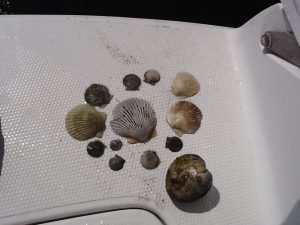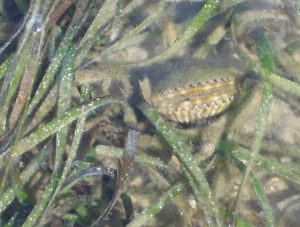Many people enjoy scallops. Just as many enjoy scalloping.
It is a great Florida family activity where everyone gets to snorkel in relatively shallow – safe waters. You explore the grassbeds for a myriad of cool marine creatures yelling across the bay to friends about all the neat things you are seeing.

Photo: Beth Fugate
And of course, there are the scallops. Sitting on top of the grass blades with their undulated ridged shells and ice blue eyes. You reach to grab one and they begin the “clap” their shells together to escape being captured. You finish the adventurous day with your limit of scallops, and it is time to eat – broiled in butter and some seasoning is my favorite.
It is great fun. However, it is becoming harder to find them.
Once found in grassbeds from Pensacola to Miami, the recreational harvest has been restricted to the Big Bend area – the commercial no longer happens. Everywhere their numbers are down and many locations within their historic range, you cannot even find them. Since 2015, Florida Sea Grant has conducted scallop searches in the Pensacola Bay area using citizen volunteers and have found only one live animal. We have found numerous shells of these creatures, who only live a year… maybe two. We have had reports of live scallops in the bay area outside of our formal search dates, I have personally found some, but the numbers are still very low – low enough that recreational harvesting in the Pensacola Bay area is closed indefinitely.
The story is the same from south of the Big Bend. Scallop searches are conducted every year and returns are low, or non-existent. So, the focus turns the Big Bend.
They are famous for the scallop seasons. Floridians travel from all neighboring counties, and from across the state, to partake in this fun activity. It is good business for these local communities. For some, it is the biggest money maker of the year. However, now we are hearing stories of low harvest numbers in some parts of the Big Bend. In recent years, Port St. Joe Bay has suffered from algal blooms and red tide that not only closed the waters to harvesting for swimming safety reasons, but because the scallop numbers declined as well. One story out of Hernando County indicated that the numbers in this region are now down. You must consider overharvesting as a problem as well.

Photo: FWC
FWC is interested in restoring these animals to parts of their range where they were once common. The Scallop Sitters program is one where volunteers can hang caged scallops raised in state hatcheries from their docks, protected from predators, and allow them to mass spawn. The first pilot project in our area was in Bay and Gulf counties… last year… when Hurricane Michael came through. Obviously, they will have to start over.
What is needed to extend this project into other bay areas?
Well, you certainly do not want to put them into waters where you know they will die. The scallop populations declined for a reason – primarily habitat loss and overharvesting. Excessive stormwater runoff decreased much needed salinity and increased grass killing turbidity. Loss of seagrass equates to loss of scallops. Florida Sea Grant is currently working with the University of West Florida, and citizen volunteers, to monitor seagrass growth and density in Santa Rosa Sound and Big Lagoon. We will have a report on this year’s work later this fall. We are also working with citizen scientists monitoring salinity in these bodies of water hoping for a mean of 20 parts per thousand or better. We will have the summer salinity reports out at the end of September. We hope these data will support the argument of extending the scallop sitters program further west.
But there is the question of overharvesting.
In recent years we have found evidence of locals in the Pensacola Bay area illegally harvesting the few scallops we have. Some residents do not know that it is illegal to harvest in these waters – it is – and the only way we can successfully restore them, is allow them to mass spawn. To do this, we need large numbers.
Each year Florida Sea Grant conducts the Great Scallop Search in the Pensacola Bay area. We also host a “Bio-Scavenger Hunt” in the fall where scallops are one of the target species. If you are interested in volunteering, contact Rick O’Connor at the Escambia County Extension Office – (850) 475-5230 ext. 111, or roc1@ufl.edu.
 0
0
